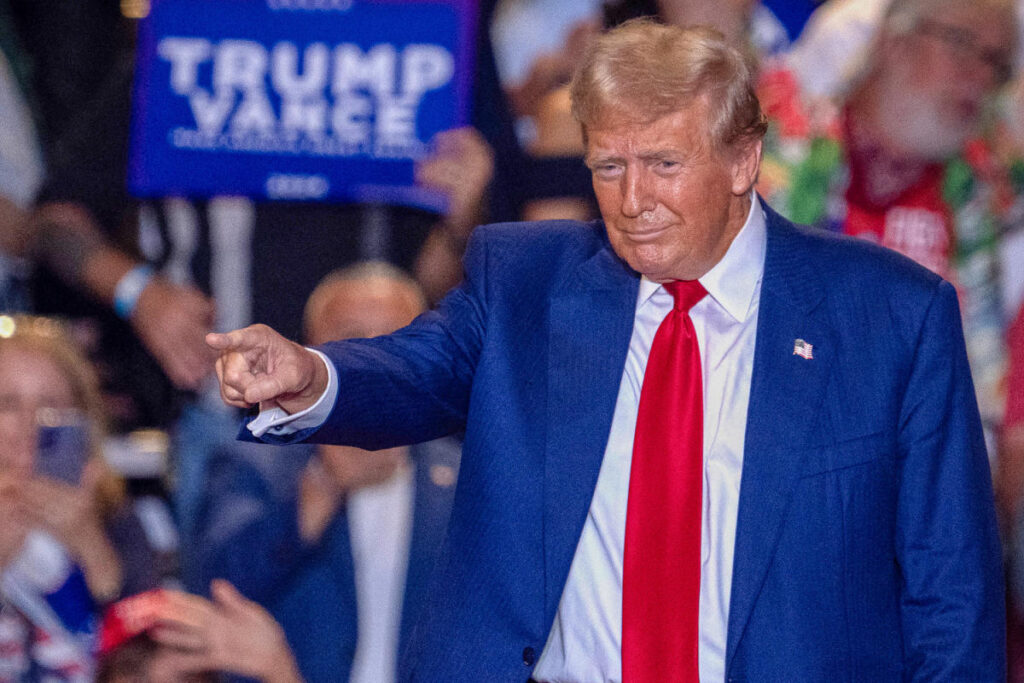In the latest edition of NBC News’ evening newsletter, “From the Politics Desk,” reporters Matt Dixon and Allan Smith delve into Donald Trump’s upcoming campaign strategy in heavily Democratic states as the 2024 presidential election approaches. Aimed at shifting focus onto what the campaign sees as failures in Democratic policies, Trump’s rallies are scheduled in traditionally blue states such as California, New York, Colorado, and Illinois, where he faces significantly uphill odds. Notably, the choice of venues like Madison Square Garden in New York City is seen as a tactical move intended to capture national media attention. The rationale behind this unconventional strategy also includes benefiting down-ballot Republican candidates in closely contested House races, particularly in states like California and New York. However, whether this approach will divert critical resources away from essential swing states remains an intriguing question in the current electoral landscape.
Chuck Todd, NBC’s chief political analyst, emphasizes the pivotal role that House control will play in shaping the next presidency, regardless of whether Donald Trump or Vice President Kamala Harris is elected. The current political environment is remarkably polarized, with potential for divided control among the presidency, House, and Senate, an unprecedented scenario that could frustrate major legislative efforts. Todd points out that while voters may not prefer divided governance, it seems to be a more favorable outcome than allowing a party they do not trust to dominate all facets of government. The implications of a divided House and White House could involve significant obstacles for ambitious policy reforms and budget negotiations, particularly if one party holds subpoena power over the presidency.
In line with the political dynamic described, President Biden recently warned of the impending Hurricane Milton while interacting with conspiracy theories alleging government manipulation of weather patterns, a point raised by political figure Marjorie Taylor Greene. Meanwhile, an alarming incident involving an Afghan national charged with a conspiracy to carry out a terrorist attack on Election Day highlights the security challenges looming over the electoral process. On a more positive note, Vice President Harris’s campaign has achieved a significant milestone, surpassing $1 billion in fundraising just weeks before the general election, a considerable achievement that reflects her robust infrastructure compared to past efforts from the Biden campaign.
As the competitive nature of the election intensifies, Harris is also actively working to alleviate Trump’s perceived advantage in economic matters among voters, a critical point in her campaign strategy as she navigates her recent rise in visibility. Harris is pivoting her focus to key battleground areas such as Arizona, an important state poised to influence the outcome of the election, particularly with the commencement of early voting. At the same time, Trump’s campaign is attempting to solidify support among the Latter-day Saints community, a demographic of growing importance in Western battlegrounds. These targeted approaches by both campaigns underscore the complexities and strategic maneuvers key to winning the support of various voter blocs.
Upcoming political debates are further contributing to the charged atmosphere of this election cycle. For instance, notable candidates like Kari Lake and Ruben Gallego are preparing intensely for their pivotal Senate debate, signaling a season of high-stakes discussions around national and local governance issues. The Michigan Senate debate exemplified this intensity, marked by heated exchanges over national security and bipartisan credentials between candidates Elissa Slotkin and Mike Rogers. With such significant issues at play, debates are expected to shape narratives that will influence undecided voters significantly, making them a critical forum for establishing candidates’ positions and competencies.
As the election approaches, NBC News encourages feedback on its political coverage, underscoring the importance of community engagement in political discourse. By promoting transparency and open communication with its readers, the newsletter seeks to foster a richer understanding of the political landscape leading up to the 2024 elections. With the added complexities of strategic campaigning, voters must remain informed about the evolving tactics of both parties, the implications of potential divided control in government, and high-profile contexts touching both national security and economic issues. The insights from NBC News aim to empower voters to navigate these dynamic and often turbulent political waters with greater awareness.

